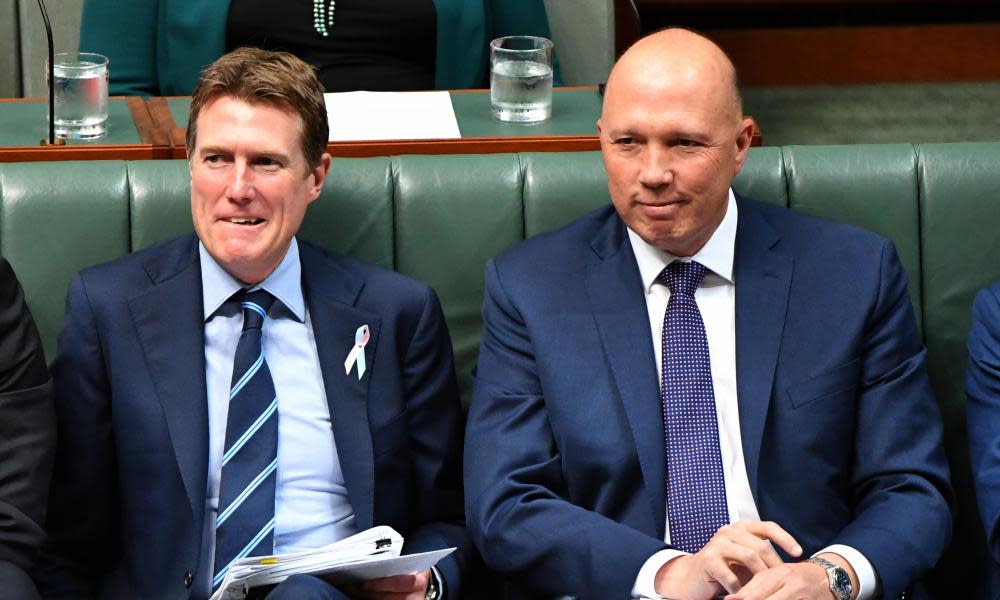Christian Porter says he can't guarantee he wouldn't prosecute journalists

The federal attorney general, Christian Porter, maintains he would be “seriously disinclined” to sign off on the criminal prosecution of journalists for public interest journalism, but added he cannot give any guarantees.
“I can’t, though, give anything more definitive than that, because my role in this process is to assess a brief that may or may not come up, and a recommendation that may or may not come up, to the commonwealth director of public prosecutions,” he told the ABC.
“And it wouldn’t even get to that point until the AFP had concluded their investigation and delivered a brief, if they were minded, a brief to the DPP for their consideration.
Related: AFP won't rule out charging News Corp journalist Annika Smethurst after raid
“So I can’t abide by the law and give a definitive view without seeing what may be the evidence, if it even reaches that point.
“But the fundamental point is that investigations, whether they be of any Australian, are conducted by the AFP, completely arm’s length from government, as it should be, but these are extra safeguards put in place in that process.”
Earlier this year, the AFP raided the home of the News Corp political editor, Annika Smethurst, and the Sydney headquarters of the ABC after both organisations published stories containing classified information.
The AFP has not ruled out charging journalists targeted in the raids, despite the public interest nature of their reporting. The search warrants used in the raids are being challenged in court.
The opposition leader, Anthony Albanese, said the government should shut down the AFP investigation.
“People should not be charged for doing their job. Journalism isn’t a crime, it’s an essential part of our democracy, we need to cherish it,” Albanese told reporters in Sydney on Sunday.
“We need to make sure whatever legislative changes are required to ensure media freedoms are adopted, it should happen in a bi-partisan way and it should happen quickly.”
The cases kicked off an examination of press freedom in Australia, with two parliamentary inquiries tasked with looking at the issue.
On Friday, media chiefs appeared at a public committee hearing in Canberra to outline challenges with Australian laws.
Meanwhile, Porter is counting on commonwealth law to override Australian Capital Territory legislation which legalises small amounts of cannabis from next year, rather than actively moving against it.
“At the moment, their law has not done what it thinks it does, which provides some sort of defence or out for people who would be possessing cannabis in the ACT,” he said.
“It doesn’t do that … they have not achieved what it is I think they set out to achieve, legally.”
The ACT decriminalised cannabis in 1992, meaning anyone found with the drug (up to 50g and two plants) is dealt with through civil penalties, rather than a court notice. In announcing the legalisation, the ACT government said it was a small “next step”.
South Australia and the Northern Territory have also decriminalised cannabis. Porter appeared to be saying that in all cases, the commonwealth law overrode the territory law, but could give no indication of which one police would follow.
Related: 'Evolution, not revolution': ACT cannabis users chilled about legalisation
“They uphold the laws that exist both state and federal or territory and federal,” he said.
Porter said he had written to the ACT’s attorney general, Gordon Ramsay, to say the territory bill, which would allow adults up to 50g of cannabis and to cultivate two plants for personal use, did not alter commonwealth laws, which criminalised cannabis possession.
Porter said he had received advice on the “terrible laws”, showing commonwealth law was “still valid”, adding he saw that if the ACT law was left as it was, “why would there be any need to override a law, which is effectively to no effect”.
“The ACT laws removed the criminal component at a territory level, but didn’t establish anything that is a positive right to possess, which means there is no defence to commonwealth law that criminalises amounts under 50g,” he said.
“My advice, and the advice that I have provided to the ACT attorney general, is that it is still against the law to possess cannabis in the ACT.”
After the ACT passed the Labor backbencher Michael Pettersson’s private member’s bill last month, Ramsay acknowledged the conflict with the commonwealth law, but said he believed “in practice” it would not apply.

 Yahoo News
Yahoo News 
